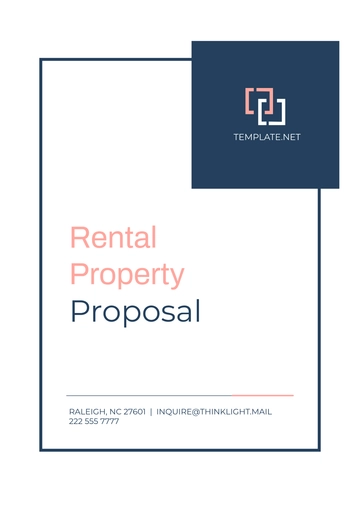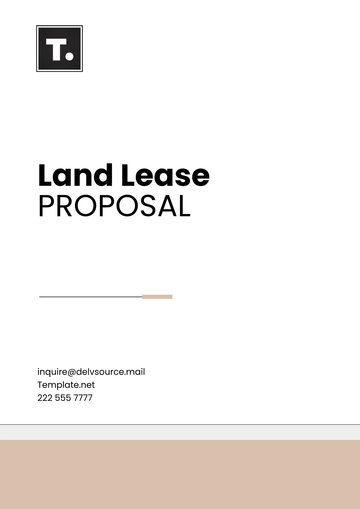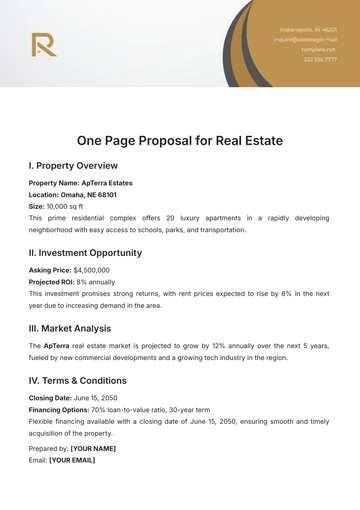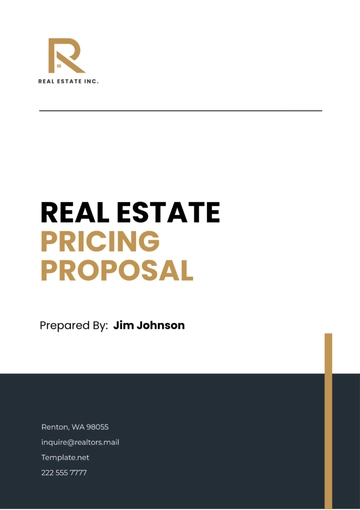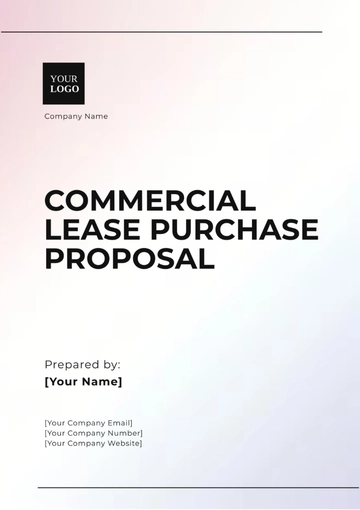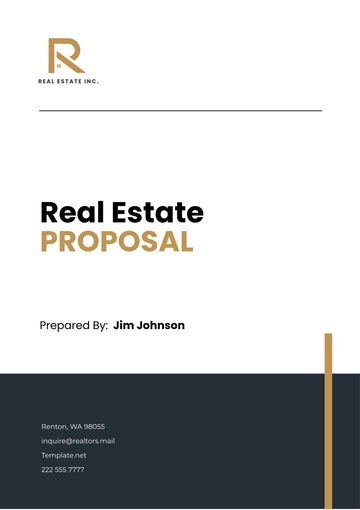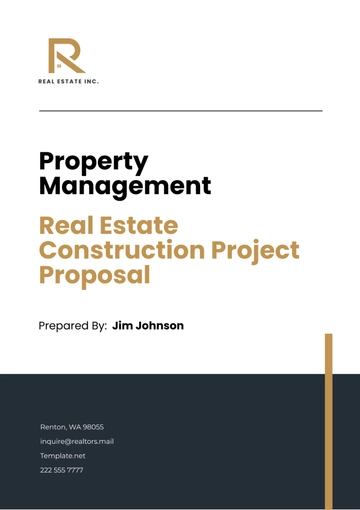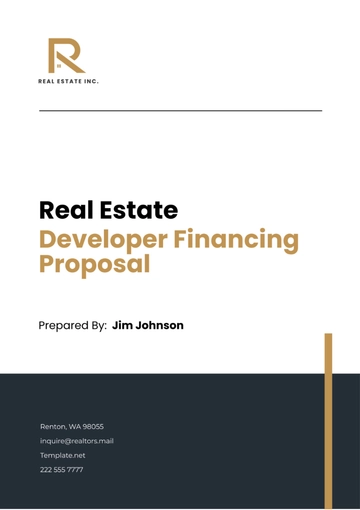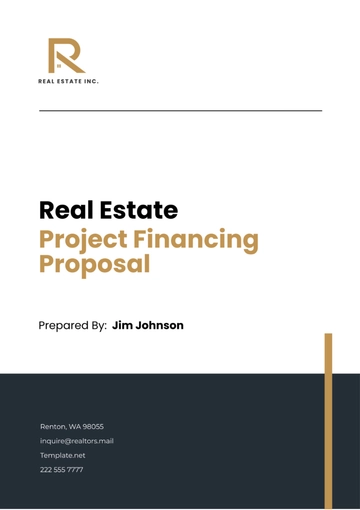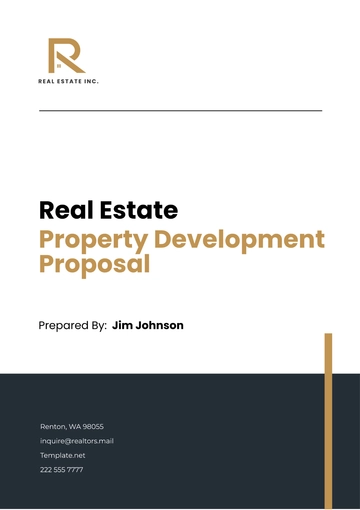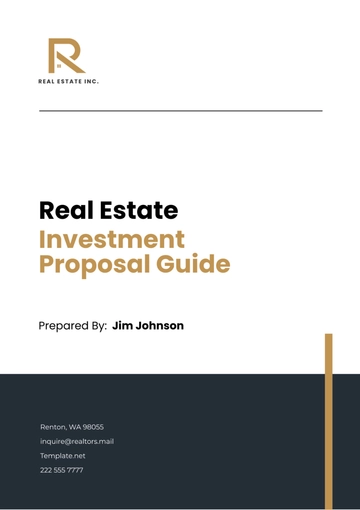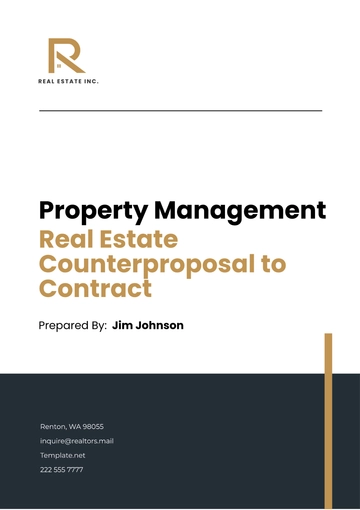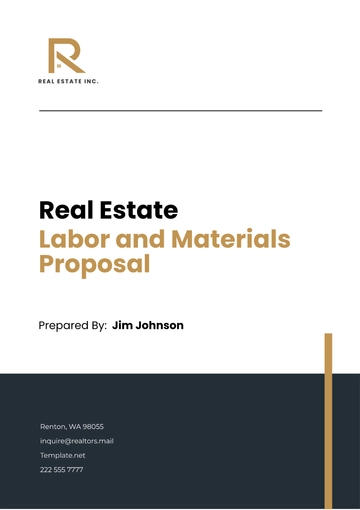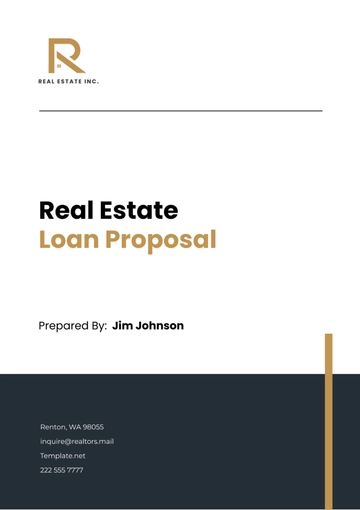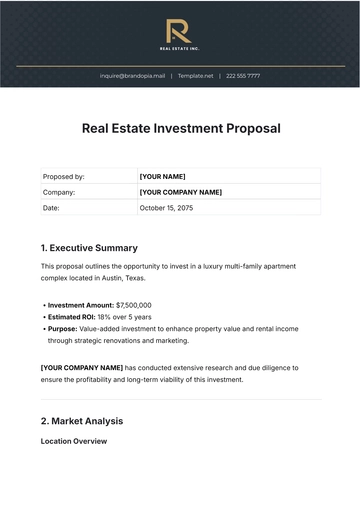Free Real Estate Business Format Proposal

Prepared by: [Your Name]
Date: [Date]
I. Executive Summary
A. Purpose of the Proposal
This section provides a brief overview of the real estate business proposal. Clearly explain the business idea, its goals, and why the proposal is being created. Include a summary of the investment opportunity or the real estate development project.
B. Business Objective
Define the primary objective of the real estate venture, whether it’s to secure funding for a new development, seek partners for a commercial property investment, or launch a property management company.
II. Business Description
A. Company Overview
Describe your business, including its name, mission, and values. Mention any relevant experience or expertise that you bring to the table, as well as the legal structure (LLC, corporation, etc.).
B. Real Estate Focus
Identify the specific type of real estate you are focused on, such as residential, commercial, industrial, or mixed-use properties. Discuss why you have chosen this market and its potential for success.
C. Long-Term Goals
Outline the long-term goals of your real estate business. Whether it's expanding to multiple locations, achieving a specific revenue target, or creating a portfolio of properties, make sure to highlight your future vision.
III. Market Analysis
A. Target Market
Describe the target audience for your real estate business, such as first-time homebuyers, high-net-worth individuals, commercial tenants, etc. Include demographic data, preferences, and behavior patterns that justify the market’s demand.
B. Market Trends
Provide a snapshot of current market trends that may affect the success of your real estate business. This could include property values, rental rates, or changes in government policies or local regulations.
C. Competitive Analysis
Identify key competitors in your area or sector. Compare their strengths and weaknesses with your business offering, and explain how you plan to differentiate yourself to capture market share.
IV. Investment Plan / Financial Projections
A. Investment Requirements
Specify how much capital is required for the real estate venture. Break down the costs involved, such as land acquisition, construction, permits, or operational expenses.
B. Revenue Projections
Provide projected income and returns on investment (ROI) over a defined period. Use realistic assumptions based on market conditions to ensure that potential investors can evaluate the opportunity’s profitability.
C. Funding Strategy
Explain the strategy for raising capital. Whether it’s through loans, private equity, crowdfunding, or a combination of sources, make it clear how funds will be secured to cover the investment.
V. Marketing Strategy
A. Advertising Channels
Identify the marketing and advertising strategies you will use to promote your real estate business. This could include digital marketing (social media, SEO, email campaigns), traditional methods (flyers, brochures), and public relations efforts.
B. Sales Strategy
Describe the approach you will take to attract buyers, tenants, or investors. Whether it’s cold calling, attending industry events, or leveraging a real estate network, explain how sales will be generated.
C. Partnerships & Collaborations
Discuss potential partnerships or collaborations with other real estate firms, developers, or service providers that could enhance your business’s reach and credibility.
VI. Operational Plan
A. Day-to-Day Operations
Outline the day-to-day operations of your real estate business. This could include property management tasks, dealing with clients, handling legal and financial paperwork, and overseeing construction or renovations.
B. Staffing Requirements
Describe the personnel needed to run your business effectively. Include roles such as project managers, property managers, accountants, and real estate agents. Explain how you will recruit, hire, and retain staff.
C. Technology & Tools
Identify any software or tools that will help streamline operations, such as property management platforms, CRM systems, or financial tracking tools.
VII. Risk Analysis
A. Potential Risks
Identify the main risks involved in your real estate business, such as market downturns, regulatory changes, or construction delays. Be transparent about challenges that could affect the success of the project.
B. Risk Mitigation Strategies
Explain the strategies in place to minimize or manage risks. This could involve diversifying investments, purchasing insurance, or having contingency plans for unforeseen circumstances.
VIII. Conclusion
A. Recap of Business Opportunity
Summarize the real estate business opportunity once again, highlighting the potential benefits for investors or partners.
B. Call to Action
Provide a clear call to action, inviting the reader to engage further, whether that’s setting up a meeting, providing funding, or forming a partnership.
C. Contact Information
Ensure that your contact details are easily accessible for follow-up. Include phone numbers, email addresses, and business website links.
- 100% Customizable, free editor
- Access 1 Million+ Templates, photo’s & graphics
- Download or share as a template
- Click and replace photos, graphics, text, backgrounds
- Resize, crop, AI write & more
- Access advanced editor
Template.net offers the Real Estate Business Format Proposal Template, perfect for drafting clear and professional real estate proposals. Fully editable and customizable, this template ensures you can personalize your offer with ease. Edit it anytime in our Ai Editor Tool to match your unique business goals. Streamline your real estate proposals today with this easy-to-use template.
You may also like
- Business Proposal
- Research Proposal
- Proposal Request
- Project Proposal
- Grant Proposal
- Photography Proposal
- Job Proposal
- Budget Proposal
- Marketing Proposal
- Branding Proposal
- Advertising Proposal
- Sales Proposal
- Startup Proposal
- Event Proposal
- Creative Proposal
- Restaurant Proposal
- Blank Proposal
- One Page Proposal
- Proposal Report
- IT Proposal
- Non Profit Proposal
- Training Proposal
- Construction Proposal
- School Proposal
- Cleaning Proposal
- Contract Proposal
- HR Proposal
- Travel Agency Proposal
- Small Business Proposal
- Investment Proposal
- Bid Proposal
- Retail Business Proposal
- Sponsorship Proposal
- Academic Proposal
- Partnership Proposal
- Work Proposal
- Agency Proposal
- University Proposal
- Accounting Proposal
- Real Estate Proposal
- Hotel Proposal
- Product Proposal
- Advertising Agency Proposal
- Development Proposal
- Loan Proposal
- Website Proposal
- Nursing Home Proposal
- Financial Proposal
- Salon Proposal
- Freelancer Proposal
- Funding Proposal
- Work from Home Proposal
- Company Proposal
- Consulting Proposal
- Educational Proposal
- Construction Bid Proposal
- Interior Design Proposal
- New Product Proposal
- Sports Proposal
- Corporate Proposal
- Food Proposal
- Property Proposal
- Maintenance Proposal
- Purchase Proposal
- Rental Proposal
- Recruitment Proposal
- Social Media Proposal
- Travel Proposal
- Trip Proposal
- Software Proposal
- Conference Proposal
- Graphic Design Proposal
- Law Firm Proposal
- Medical Proposal
- Music Proposal
- Pricing Proposal
- SEO Proposal
- Strategy Proposal
- Technical Proposal
- Coaching Proposal
- Ecommerce Proposal
- Fundraising Proposal
- Landscaping Proposal
- Charity Proposal
- Contractor Proposal
- Exhibition Proposal
- Art Proposal
- Mobile Proposal
- Equipment Proposal
- Student Proposal
- Engineering Proposal
- Business Proposal



